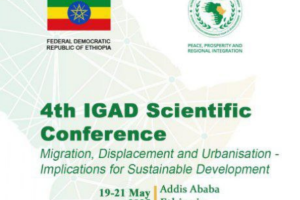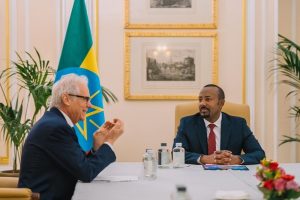
The Horn of Africa is a region that holds great importance in terms of its geopolitical and strategic position. However, the lack of peace and constant instability is having a detrimental effect on the region’s development. The absence of peace in the Horn of Africa hinders progress and prevents the region from reaching its full potential. It creates an environment of uncertainty and fear, which discourages investments and economic growth.
When there is no peace, it creates a lot of problems. People feel scared and worried about what might happen next. They don’t feel safe going about their daily lives or doing business. Businesses need peace to grow and be successful. But when there is so much instability, it becomes really hard for them to thrive and make progress. This means that the economy in the region suffers. There are not enough opportunities for people to find jobs and support themselves and their families.
Because of the lack of peace, people are hesitant to invest their money or start new businesses in the region. They don’t want to take risks in an unstable environment. This leads to a lack of economic growth and development in the Horn of Africa. It’s difficult for the region to attract outside investments and support because of the ongoing conflicts and insecurity. Not having enough peace also means that it’s challenging for governments in the region to provide essential services and support to their citizens.
The resources that could be used to improve healthcare, education, and infrastructure are often diverted towards military efforts and security measures. This further hampers the region’s ability to progress and improve the quality of life for its people. Moreover, the constant state of instability and violence causes displacement and refugee crises.
Many people are forced to leave their homes and seek safety elsewhere both within the region and beyond. Without a stable environment and opportunities for economic growth, it becomes difficult for individuals and families to escape poverty. Basic needs such as food, shelter, and healthcare become even harder to access in such circumstances.
Additionally, the absence of peace hinders cooperation and collaboration between countries in the region. Instead of working together for mutual benefits, there is often tension and conflict. This prevents the region from harnessing its full potential and taking advantage of its strategic position. The lack of peace in the Horn of Africa has far-reaching consequences affecting not only the region itself but also neighboring countries and the international community.
The Horn of Africa’s strategic importance is overshadowed by the lack of peace and constant instability plaguing the region. Addressing this issue is crucial for its economic development, the well-being of its people, and ensuring regional and global stability. The Horn of Africa is a special place because of its location and how important it is.
When there is no peace, it makes people feel unsure and scared about what might happen next. This makes it very hard for businesses to get bigger and for the economy to improve. People do not want to put their money into an unstable place, so they do not start new businesses or invest their money. This means there are not enough chances for people to find jobs and make enough money to have a good life.
People are reluctant to start businesses or invest their money in an unstable region. This lack of development opportunities leads to high rates of unemployment and poverty affecting the lives of millions of people. The constant state of instability in the region disrupts essential services such as healthcare and education. Hospitals and schools struggle to function properly when there is violence and conflict around them.
This negatively impacts the well-being of the people, especially the most vulnerable, including women and children. The lack of peace increases the refugee crisis in the Horn of Africa. People flee their homes and seek safety in neighboring countries or even further away. This puts a strain on resources and creates tensions between host communities and refugees. It is a humanitarian crisis that requires immediate attention and resolution.
Moreover, the absence of peace in the region perpetuates cycles of violence and revenge. Conflicts between different ethnic or political groups continue unabated causing widespread suffering and loss of life. The lack of peace also breeds extremism and terrorism as desperate individuals turn to violent means to express their grievances. In order to achieve lasting peace and stability, governments and stakeholders must prioritize regional cooperation. This means putting aside differences and working together towards common goals.
By engaging in open and honest dialogue, they can find solutions to conflicts, promote reconciliation, and build trust among different communities. It is important for governments to work together to address cross-border issues. This includes tackling transnational crimes such as human trafficking, drug smuggling, and illegal arms trade. Cooperation in these areas can help create a safer environment for the people of the Horn of Africa. In addition to peace building efforts, governments and stakeholders must focus on sustainable development in the region.
Regional cooperation should involve fostering cultural exchange and understanding among different communities in the Horn of Africa. By celebrating diversity and promoting tolerance, governments can help build bridges and strengthen social cohesion. Sustaining regional cooperation requires long-term commitment and dedication. It is not a quick fix solution, but rather a continuous effort that must be upheld by future generations.
Governments and all the people involved in the Horn of Africa should work together more closely to make sure there is peace and progress in the region for a long time. To achieve this, they need to focus on regional cooperation. This means talking to each other and finding common ground to solve problems and make decisions together. By strengthening regional cooperation, governments can build strong relationships with each other. They can have open and honest conversations, listen to each other’s ideas, and find ways to work together towards common goals.
By sharing resources, knowledge, and expertise, governments can work together to improve infrastructure, provide better education and healthcare, and create economic opportunities for all. Each country in the Horn of Africa has its own unique challenges and successes. By sharing these stories, governments can learn from each other and find innovative solutions to common problems.
Regional cooperation strengthens the voice of the Horn of Africa on the global stage. When countries in the region speak with one voice, they can have a greater impact in international discussions and negotiations. This can help them advocate for their interests and secure favorable outcomes for their citizens. In order to strengthen regional cooperation, governments should invest in building trust and understanding among themselves.
Governments and all concerned stakeholders in the Horn of Africa should strengthen regional cooperation diplomacy in order to ensure lasting peace and sustainable development, Foreign Affairs Institute Senior African Affairs Researcher Gizachew Asrat said, according to information obtained from Ethiopian News Agency.
The senior researcher noted that conflicts and political instability continue to be challenges for the countries of the region.
Despite the high geopolitical and strategic importance of the region, the lack of peace and instability is having a negative impact on the development of the region.
According to him, the Horn of Africa, which comprises Ethiopia, Eritrea, Djibouti, Sudan, South Sudan and Somalia, is an important region for the promotion of regional economic and political sphere.
It is, therefore, important to realize the importance of the geopolitical and economic significance of the region and strive to transform the region based on strong political commitment.
Gizachew added that the Horn has been marred with conflicts and internal political instability that have become major bottlenecks for the peaceful development of the region.
Inability to build strong democratic institutions, economic hurdles, and competition over scarce resource, internal squabbling and insecurity that have continued unabated have become causes for plunging the countries in the region into political crisis, he said.
The countries in the region do not seem to exploit their resources through effective cooperation, and this has to be reversed in order to resolve the outstanding challenges in a more sustainable manner.
Therefore, promoting peace and stability in the region for regional integration and peaceful development is crucial, Gizachew said.
The senior researcher believes that regional integration will not be realized without the political commitment of the countries.
The countries should, therefore, have the commitment and interest for the integration to become a reality.
Cooperation and economic integration of countries is key to solving political, economic and social problems in the region.
Gizachew underscored the importance of political commitment of the leadership in the region and the support to be provided from the AU and IGAD to ensure a viable regional union.
Countries in the region should act in unison to resolve threats to the security in the region, terrorism, human trafficking, illegal financial transactions and contraband, he further noted.
It is high time also that the countries in the region committed themselves to putting in place strategies for border administration between the countries.
BY ADDISALEM MULAT
THE ETHIOPIAN HERALD TUESDAY 21 NOVEMBER 2023




